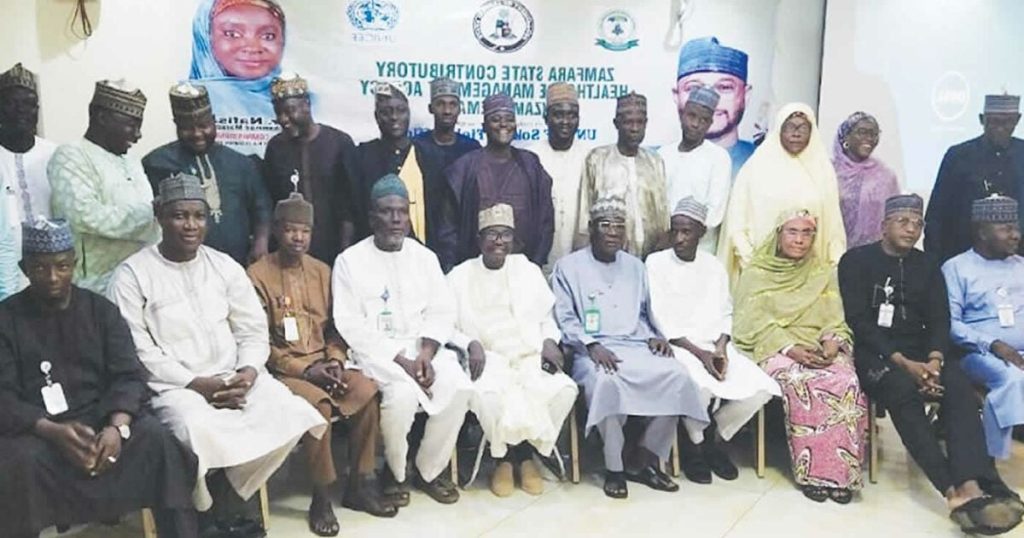Strengthening Zamfara’s Health Contributory Programme: A Collaborative Effort Towards Universal Health Coverage.
Zamfara State, Nigeria, is taking proactive steps to bolster its healthcare system and ensure wider access to quality medical services for its citizens. A crucial two-day advocacy meeting, convened by the United Nations Children’s Fund (UNICEF) in Birnin Kebbi, brought together key stakeholders to strategize on mobilizing domestic resources to strengthen the Zamfara Contributory Health Management Agency (ZAMCHEMA), the state’s health insurance program. This collaborative effort signifies a renewed commitment to achieving universal health coverage, with particular emphasis on protecting vulnerable groups such as women and children.
The meeting, held from September 18th to 19th, assembled a diverse group of participants, including chairmen from all 14 Local Government Areas (LGAs) of Zamfara State. High-ranking government officials, including the Commissioner for Local Government and Chieftaincy Affairs, the Executive Secretary of ZAMCHEMA, members of the State House of Assembly committees on health, finance, and appropriation, and representatives from the Ministries of Health and Budget and Economic Planning, were also present. The inclusion of UNICEF health financing specialists, both in person and virtually, underscored the organization’s commitment to supporting Zamfara’s healthcare initiatives. This collaborative gathering provided a platform for open dialogue and the development of practical strategies to address the challenges facing ZAMCHEMA.
A primary focus of the meeting was scaling up enrollment in ZAMCHEMA, which was established in 2018 to provide affordable and equitable healthcare access. With a current insurance coverage rate of only 5.9 percent of the state’s population, the urgency of securing sustainable funding was emphasized, especially in light of decreasing foreign aid. Participants recognized the crucial role of domestic financing in ensuring the long-term viability and effectiveness of the program. The meeting served as a critical forum for exploring innovative approaches to resource mobilization and sustainable healthcare financing.
The meeting participants commended Governor Dauda Lawal’s commitment to improving healthcare in Zamfara State. His approval of the enrollment of local government staff and their spouses into ZAMCHEMA, coupled with the allocation of N1 billion in counterpart funding for UNICEF-supported health programs, were acknowledged as significant steps forward. Further commendation was given for the ongoing investment in renovating and equipping health facilities throughout the state, as well as the recruitment of additional health workers to enhance service delivery. These initiatives demonstrated a proactive approach to strengthening the healthcare infrastructure and workforce, laying the foundation for improved healthcare access and quality.
The meeting culminated in a comprehensive communiqué outlining key recommendations and resolutions. Stakeholders advocated for the enrollment of two percent of Zamfara’s poor and vulnerable households, identified through the National Social Register, into ZAMCHEMA. This initiative, with an estimated annual cost of over N1 billion, would provide coverage for approximately 89,232 individuals across 147 wards. The communiqué also urged LGAs to fulfill their 12 percent employer contribution for staff health insurance, extending coverage to four children per enrolled household. These measures were seen as crucial for expanding access to essential healthcare services for vulnerable populations and ensuring that families have access to the care they need.
The communiqué further outlined several crucial financial commitments and strategies. It recommended allocating N1.3 billion in the 2025 budget for social protection initiatives, including cash transfers for child health and women’s empowerment programs. A commitment to sustaining monthly drug procurement worth N42 million for free distribution in Primary Health Care centers was also emphasized. Furthermore, the communiqué highlighted the importance of partnering with the National Identity Management Commission to register poor and vulnerable households for social protection programs. Finally, it called for developing a comprehensive domestic funds mobilization strategy with technical support from UNICEF. These resolutions reflected a holistic approach to healthcare financing and emphasized the importance of strategic partnerships and sustainable resource mobilization.
The communiqué, signed by key stakeholders including the Commissioner for Local Government and Chieftaincy Affairs, the Chairman of the Association of Local Governments of Nigeria (ALGON) Zamfara chapter, and the Secretary of the State Assembly Committee on Local Government, reaffirmed the collective responsibility of government, local authorities, and development partners in strengthening ZAMCHEMA. The meeting, deemed both timely and impactful, marked a significant milestone in Zamfara’s pursuit of universal health coverage, with a clear focus on protecting the health and well-being of its most vulnerable citizens. This collaborative effort signifies a crucial step towards building a more robust and equitable healthcare system in Zamfara State.














